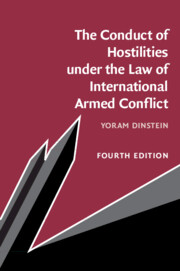Book contents
- The Conduct of Hostilities under the Law of International Armed Conflict
- The Conduct of Hostilities under the Law of International Armed Conflict
- Copyright page
- Contents
- Introduction to the Fourth Edition
- Preface
- Table of Cases
- Table of Treaties
- Abbreviations
- 1 The General Framework
- 2 Lawful Combatancy
- 3 Prohibited Weapons
- 4 Lawful Targets of Attack
- 5 Protection from Attack of Civilians and Civilian Objects
- 6 Persons Entitled to Special Protection
- 7 Objects Endowed with Special Protection
- 8 Protection of the Natural Environment
- 9 Specific Methods of Warfare
- 10 War Crimes, Orders, Command Responsibility and Defences
- General Conclusions
- Index of Persons
- Index of Subjects
5 - Protection from Attack of Civilians and Civilian Objects
Published online by Cambridge University Press: 03 November 2022
- The Conduct of Hostilities under the Law of International Armed Conflict
- The Conduct of Hostilities under the Law of International Armed Conflict
- Copyright page
- Contents
- Introduction to the Fourth Edition
- Preface
- Table of Cases
- Table of Treaties
- Abbreviations
- 1 The General Framework
- 2 Lawful Combatancy
- 3 Prohibited Weapons
- 4 Lawful Targets of Attack
- 5 Protection from Attack of Civilians and Civilian Objects
- 6 Persons Entitled to Special Protection
- 7 Objects Endowed with Special Protection
- 8 Protection of the Natural Environment
- 9 Specific Methods of Warfare
- 10 War Crimes, Orders, Command Responsibility and Defences
- General Conclusions
- Index of Persons
- Index of Subjects
Summary
The history of LOIAC can be described as a sustained effort to ensure that innocent civilians are protected from the havocs of war. Notwithstanding LOIAC strictures, it is impossible to preclude altogether the possibility of civilian casualties and damage to civilian objects in wartime. Indeed, some civilian losses and damage are virtually postulated, as long as they constitute lawful collateral damage (see infra 505 et seq.). However, the obligation of Belligerent Parties to distinguish at all times between civilians and combatants – as well as between civilian objects and military objectives – is the mainspring of LOIAC as it currently stands and as reflected in the ‘[b]asic rule’ of Article 48 of AP/I (quoted supra 328). Allegations that ‘[t]he distinction between combatant and non-combatant has all but vanished’927 are utterly at odds with present-day LOIAC.
- Type
- Chapter
- Information
- Publisher: Cambridge University PressPrint publication year: 2022
- 1
- Cited by

